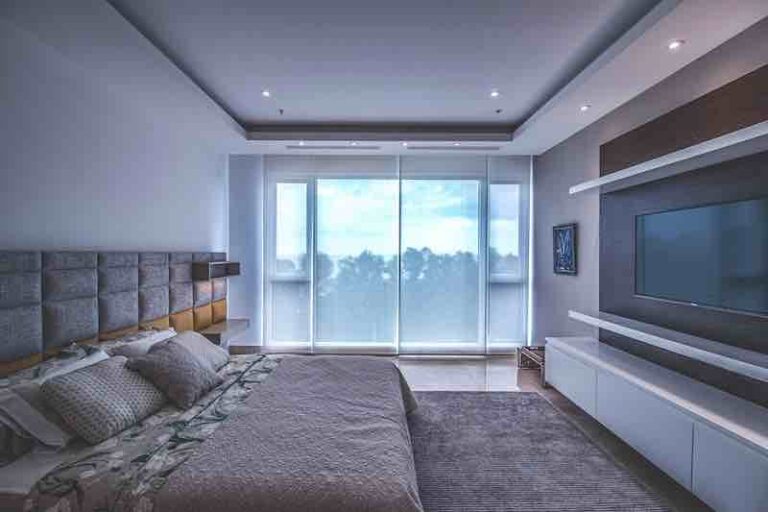It’s a ta leas old as time, and everyone knows that a relaxing environment is essential for a good night’s sleep. People simply sleep better when their bedroom is set up with the right amount of light and noise levels, temperature, and comfort. And, since sleep quality and duration are essentially tied to other aspects of our health, a bedroom environment that promotes sleep can significantly improve how you feel during the day.
leas old as time, and everyone knows that a relaxing environment is essential for a good night’s sleep. People simply sleep better when their bedroom is set up with the right amount of light and noise levels, temperature, and comfort. And, since sleep quality and duration are essentially tied to other aspects of our health, a bedroom environment that promotes sleep can significantly improve how you feel during the day.
And since we hope you spend at least 1/3 of your life in your bedroom sleeping soundly, even if your sleep is less than ideal, creating a bedroom space that incorporates all the elements for complete restfulness and relaxation is important.
In short, your bedroom should be ideally optimized for a perfect night’s sleep.
So while the interior design of your bedroom should not only reflect your style, it should also foster a sense of calm that promotes sleep. Below are some tips on how to create the perfect sleep environment, from the bed itself down to the scent of your room:
The Bed: the centrepiece of your bedroom.
Whether you prefer a firm or soft mattress, you need one that will support your end goal: to get that perfect nights’ sleep. We are helping sleepers to shift the importance to the mattress. It should be considered an important investment, so make sure to splurge on (or research extensively) one that will support you and provide the right pressure point relief to suit your body weight and sleeping position.
Remember, sleeping on an incorrect stress and back pain.
The Elements: Pillows & Linens
But it doesn’t stop at what supports you while you sleep. Pillows, blankets and linens also play a key role in inviting the best quality of sleep. Make sure that your pillow supports your sleeping habits, and that sheets are washed at least every week to reduce the potential buildup of dust mites and allergens. People that have slept on fresh sheets report deeper and sounder sleep. Who doesn’t enjoy that feeling of crisp linens when they hit the pillow?!
Air Quality: The Ideal Microclimate
FreshBed is passionate about creating the ideal climate for sleepers. We are downright passionate about this subject (see why — point to FB video).
Air quality is a key factor to ensuring you get a healthy night’s sleep. Research has found that ventilation and fresher air are associated with better sleep and problems such as mold buildup have been correlated with with sleep problems and daytime fatigue.
The air you breathe at night can have so many effects on the quality of your sleep. In short, if the air is not properly purified, or proper ventilation is not possible, the greater the risk of allergens, dust mites or mold having a negative impact on your sleep.
Therefore, the perfect climate matters! Ensure you ventilate your room during the day and if possible install air purifiers in the bedroom so you have a healthy sleep bubble (see FreshBed).
Temperature
Ever sleep in a room that was too hot, and spend the whole night tossing and turning? This is why experts suggest aiming for a cooler bedroom that can help support a better night’s sleep.
So we would not be able to discuss optimal sleep without mentioning the temperature of your room. Your bedroom temperature should be comfortable for you, but to ensure an ideal temperature the recommended is between 60 to 71 degrees Fahrenheit (15.6 to 22.0 degrees Celsius).
Smells
Everyone loves a pleasant scent in the bedroom, for a spa-like feeling, right? For some, it is part of a night-time routine.
While odors shouldn’t be used as a reliable source to wake you up from sleep, they do can promote and cultivate a calming environment for a peaceful night’s sleep. Aromatherapy and essential oils, such as lavender, are great to induce support sleep and calm.
But, be careful about how they are presented in the bedroom! While burning candles to de-stress from a long day is great, they can also affect the air quality in the room and aggravate asthma symptoms or irritate the respiratory tract.
A great alternative to candles are diffusers, beeswax or soy candles. If those are not available, then we suggest extinguishing candles one hour before bed and ventilating the room properly before you fall asleep.
Light
Let’s not forget the lights! Lighting is an important aspect to any bedroom space. Dimmer switches are ideal as an overhead light fixture, as well as a table lamp by the side of the bed.
Preparing your room for an optimal night’s sleep means keeping the lights low in the evening. The absence of light allows the body to release melatonin, and melatonin helps to prepare the body to get ready for sleep.
And while the morning sun is a great gift from Mother Earth to wake up to, it is also a good idea to invest in blackout curtains to block city lights at night and early morning sun if you are a late sleeper.
Declutter
Lastly, try to clear the mess under or around the bed. You want to foster a Zen and calm environment and allow the air to flow freely around the bed and in the bedroom. The more clutter around (or under) the bed, the less the probability that air flow can be delivered back to you throughout the night.
Academic studies have also proven clutter has a negative effect on the mind. It’s the old adage: a tidy bedroom promotes a quieter mind.
When it comes to getting a restful night’s sleep, these elements matter. So if you’re tossing and turning at night, don’t forget to pay attention to your sleep environment and incorporate a night-time routine and ensure that your room is cool, dark, and silent.



